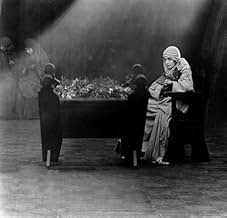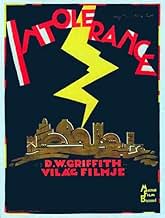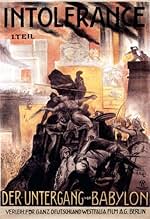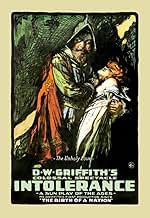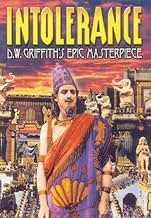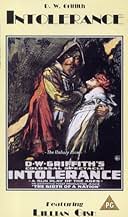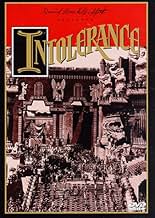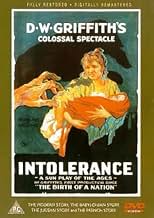VALUTAZIONE IMDb
7,7/10
17.474
LA TUA VALUTAZIONE
La storia di una povera giovane donna, separata dal pregiudizio dal marito e dal bambino, è intrecciata con i racconti di intolleranza nella storia umana.La storia di una povera giovane donna, separata dal pregiudizio dal marito e dal bambino, è intrecciata con i racconti di intolleranza nella storia umana.La storia di una povera giovane donna, separata dal pregiudizio dal marito e dal bambino, è intrecciata con i racconti di intolleranza nella storia umana.
- Regia
- Sceneggiatura
- Star
- Premi
- 2 vittorie totali
F.A. Turner
- The Dear One's Father
- (as Fred Turner)
Julia Mackley
- Uplifter
- (as Mrs. Arthur Mackley)
John P. McCarthy
- Prison Guard
- (as J.P. McCarthy)
Recensioni in evidenza
I first saw this picture as a teenager some thirty years ago. I had no idea what to expect; all I knew was the famous still of Belshazzar's feast which has become one of the best known icons depicting the extravagance of crazy old Hollywood. But I was astounded and bowled over by what I saw. I will make no attempt at a plot synopsis here, since several other reviewers on this site have done so. Most readers already know that Griffith set out to tell four separate stories, laid in four widely spaced historical periods, and that he intercut freely between them, increasing the tempo as the film proceeded, and attempted to bring all four to a climax simultaneously. Clearly he bit off more than he, or anybody, could chew; but the fact that the limits of what cinema could do were being pushed so hard so early is what fascinated me then, and still fascinates me now. I wish to heaven that college film courses would just blow off "Birth of a Nation" and consign it to the oblivion it largely deserves, and show "Intolerance" instead, for this indeed is Griffith's monument, despite its poor state of repair; and at the risk of being technical I would like to address this. I have noticed that the one negative comment running most consistently through the reviews posted on this website is the relative lack of weight given to the French and Judaean sequences relative to the Modern and Babylonian narratives. This is largely the fault of the movie's checkered preservation history. When "Intolerance" failed to make huge sums at the box office, Griffith released the Babylonian and Modern stories as individual features in 1919, reshooting some scenes along the way. He cut up the original negative (gasp!) to do this, and by the time he decided to reassemble the whole movie in 1926, it turned out that all the king's horses and all the king's men couldn't quite put Humpty Dumpty back together again. There was never a shooting script, or a written continuity; Griffith kept the whole thing in his head, and moreover could never stop tinkering with it while it was in release! Consequently, while the Babylonian and Modern stories have survived largely intact, the French and Judaean episodes were depleted by about half. So when we see it now we must recognize that we are viewing a broken sculpture. The movie is a restorer's nightmare; almost a third of its 2000- plus shots exist in variant versions, and the captions were rewritten more than once. But, broken as it is, it's still magnificent. There has never been, and will never again be, anything like it. It has all of Griffith's inconsistencies: subtle and naturalistic acting from Mae Marsh and Robert Harron as the luckless couple in the Modern Story are seen cheek by jowl with outrageous mugging by Walter Long as the Musketeer of the Slums, or Josephine Crowell's Catherine de Medici in France; but no masterpiece on this scale is ever consistent, after all. I love Connie Talmadge's Mountain Girl from Babylon; smart, funny and crazy. Other favorites: Tully Marshall as the villainous Priest of Bel; Seena Owen as the Princess beloved, my personal nomination for Most Fabulous Body of the Hollywood 1910s, never mind the deranged costumes; Alfred Paget as a genuinely humane Belshazzar; Howard Gaye as a believable and totally unforced Jesus. Everything the silent screen of 1916 could do, good, bad, subtle, overblown, crazy or glorious is embodied here; and Griffith never rode so high again. The most satisfactory version currently available, in my opinion, is the Kino on Video edition on vhs and dvd, the one illustrated when you first call the picture up on this site. There are some problems and a few missing bits that I take exception to, but overall this is the version that first time viewers should try.
This mammoth production and DW Griffith's 1916 masterpiece was his followup to The Birth of a Nation. Intolerance blends 4 stories of historical intolerance as a warning against the current-day evils of war. The French and Judean stories are OK. The Babylonian and Modern stories are spectacular. Where Griffith experimented with closeups and intercutting stories in Birth of a Nation, these techniques are mastered in Intolerance. Griffith also continues his incredible eye for composition and scenery and costumes in this epic film.
The sets and costumes for the Babylonian story are among the best in film history. And the battle scenes equal anything in Birth of a Nation. Griffith's Babylonian set is so huge it allows for horse-drawn chariots to ride side by side on the road at the top of the towering walls. The camera shot that shows the chariots and the battle many stories below is astounding. There is also the famous camera shot that slowly moves closer and closer the the city steps and gates where hundreds of dancers perform a pagan production number. Just amazing.
The emotional oomph of this film comes from the modern story where a young couple living in a tenement apartment almost gets destroyed by society do-gooders. The intercutting of scenes here is masterful as the rescuers race to save the hero who is about to be hanged. Melodrama to be sure, but in a form never seen before 1916.
And as usual Griffith assembles a terrific cast and elicits great performances from many of them.
Constance Talmadge plays the cinema's first feminist heroine as the Mountain Girl in the Babylonian story. She's wonderful as the saucy girl who eats onions while on the block to be sold as a slave. As the men come near to examine her (she's dressed in a pelt) she shakes her onions at them and kicks at them. Hilarious. The story is complicated but she overhears a plot to attack the city and the ruler (who set her free) she adores. Great scenes of Talmadge racing a chariot through the desert. Great battle scenes that are unforgettable. Great orgy scenes. This is just a wonderful story that is so eye-filling, you have to watch it several times to take everything in.
The modern story boasts a perfect performance by Mae Marsh as the "Dear One." Robert Harron is the husband, and Miriam Cooper (very underrated) is the "bad girl." One of the most harrowing scenes I can remember is when the "do-gooders" (headed by Vera Lewis) come to take Marsh's baby after Harron is falsely arrest for murder. Marsh is so realistic in this frenzied scene that your heart just stops. Harron is also excellent as the hapless boy who gets framed for murder. The editing of this arc of the film sets the standard for decades to come.
Intolerance must be seen by any serious film buff. It's a long film but is unforgettable. The cast list is impressive and includes the above-mentioned Constance Talmadge, Mae Marsh, Robert Harron, Miriam Cooper, Lillian Gish, Vera Lewis, Ralph Lewis, Douglas Fairbanks, Bessie Love, Wallace Reid, Elmo Lincoln, Elmer Clifton, Mary Alden, Constance Collier, Carmel Myers, Erich von Stroheim, Donald Crisp, Carol Dempster, Marguerite Marsh, Tully Marshall, Natalie Talmadge, Alma Rubens, Seena Owen, Margery Wilson, Eugene Palette, Ethel Grey Terry, Owen Moore, Alfred Paget, Joseph Henabery, Josephine Crowell, Ruth St. Denis, Ted Shawn, Mildred Harris, Walter Long, Sam De Grasse, Monte Blue, Kate Bruce, Nigel De Brulier, Pauline Starke, Lillian Langdon, and future directors King Vidor, Frank Borzage, and Tod Browning!
The sets and costumes for the Babylonian story are among the best in film history. And the battle scenes equal anything in Birth of a Nation. Griffith's Babylonian set is so huge it allows for horse-drawn chariots to ride side by side on the road at the top of the towering walls. The camera shot that shows the chariots and the battle many stories below is astounding. There is also the famous camera shot that slowly moves closer and closer the the city steps and gates where hundreds of dancers perform a pagan production number. Just amazing.
The emotional oomph of this film comes from the modern story where a young couple living in a tenement apartment almost gets destroyed by society do-gooders. The intercutting of scenes here is masterful as the rescuers race to save the hero who is about to be hanged. Melodrama to be sure, but in a form never seen before 1916.
And as usual Griffith assembles a terrific cast and elicits great performances from many of them.
Constance Talmadge plays the cinema's first feminist heroine as the Mountain Girl in the Babylonian story. She's wonderful as the saucy girl who eats onions while on the block to be sold as a slave. As the men come near to examine her (she's dressed in a pelt) she shakes her onions at them and kicks at them. Hilarious. The story is complicated but she overhears a plot to attack the city and the ruler (who set her free) she adores. Great scenes of Talmadge racing a chariot through the desert. Great battle scenes that are unforgettable. Great orgy scenes. This is just a wonderful story that is so eye-filling, you have to watch it several times to take everything in.
The modern story boasts a perfect performance by Mae Marsh as the "Dear One." Robert Harron is the husband, and Miriam Cooper (very underrated) is the "bad girl." One of the most harrowing scenes I can remember is when the "do-gooders" (headed by Vera Lewis) come to take Marsh's baby after Harron is falsely arrest for murder. Marsh is so realistic in this frenzied scene that your heart just stops. Harron is also excellent as the hapless boy who gets framed for murder. The editing of this arc of the film sets the standard for decades to come.
Intolerance must be seen by any serious film buff. It's a long film but is unforgettable. The cast list is impressive and includes the above-mentioned Constance Talmadge, Mae Marsh, Robert Harron, Miriam Cooper, Lillian Gish, Vera Lewis, Ralph Lewis, Douglas Fairbanks, Bessie Love, Wallace Reid, Elmo Lincoln, Elmer Clifton, Mary Alden, Constance Collier, Carmel Myers, Erich von Stroheim, Donald Crisp, Carol Dempster, Marguerite Marsh, Tully Marshall, Natalie Talmadge, Alma Rubens, Seena Owen, Margery Wilson, Eugene Palette, Ethel Grey Terry, Owen Moore, Alfred Paget, Joseph Henabery, Josephine Crowell, Ruth St. Denis, Ted Shawn, Mildred Harris, Walter Long, Sam De Grasse, Monte Blue, Kate Bruce, Nigel De Brulier, Pauline Starke, Lillian Langdon, and future directors King Vidor, Frank Borzage, and Tod Browning!
I saw a four hour, ten minute version of this as the University of Chicago's Ida Noyes Hall in February, 1993 -- restored with stills and copyright photos, with a new score by Gillian Anderson, featuring the composer conducting the University Symphony Orchestra -- what an experience!
And where, oh where, is this restored version to be seen today?
Somebody get on the copyright owner's case to release the 4:10 version, with Gillian Anderson's score!
This fine film, possibly the quintessential Griffith, has been in the shadow of the notorious Birth of a Nation too long. (Of course, without Birth of a Nation's controversy, this might never have been made). Intolerance has more spectacle than Birth, far more "speaking" parts (if that's not an oxymoron, I don't know what is!), and is far more PC -- but not in a negative way.
See it, in any form you can!
And where, oh where, is this restored version to be seen today?
Somebody get on the copyright owner's case to release the 4:10 version, with Gillian Anderson's score!
This fine film, possibly the quintessential Griffith, has been in the shadow of the notorious Birth of a Nation too long. (Of course, without Birth of a Nation's controversy, this might never have been made). Intolerance has more spectacle than Birth, far more "speaking" parts (if that's not an oxymoron, I don't know what is!), and is far more PC -- but not in a negative way.
See it, in any form you can!
My primary interest in this was as a foundation of cinema; so an academic interest, but - having influenced so many things I am very keen on - not without some excitement at the prospect of discovery of this early common source.
So much of cinema flows out from this; a host of recognizable names tutored on set - Von Stroheim, Tod Browning, Woody Van Dyke, Victor Fleming, Elmer Clifton, Jack Conway, King Vidor - and even more once the film rippled across the world. In Moscow, it was the raw material film students were given to dismantle in Lev Kuleshov's fledgling film school, the first ever. And in France Abel Gance must have been awe-struck by the sheer size of the canvas, if his own films offer any clue.
So yes, a fast-paced, lavish blockbuster - it cost at the time an unprecedented $2m to make - with literally a cast of thousands animating history, the story of Hollywood excess begins here - in Italy it had started earlier, with their Roman spectacles. The filmmaker as god, who does not simply photograph reality but constructs entire worlds, permits our vision to travel in the places that we could earlier only imagine.
But the fundamental technique is still from the theatre; that means a grand stage - elevated from us, separate - with every now and then a different backdrop, actors who pantomime sweeping emotion, the eye usually fixed in a distance. Oh the camera moves, but it moves with the stage. And what a grand stage it is.
I suppose it must have been desirable at the time when cinema, and so the possibilities of seeing, made the world feel so new and perhaps so alive again, when so many of the trials and heroism of the world narrative were yet to be immortalized in this new way, that a film like this should try to encompass so much; the Crucifixion, medieval France, ancient Babylon, they're all urgently envisioned in the same space.
It is in more ways than one that Griffith wrote the history of cinema then; by pioneering what he did in terms of a film language, but also by creating a vast expanse - a daunting 3 hours of film - that fills the prehistoric void, in terms of cinema, with a cachet of images, that creates a history of images. Now with the Pharisees or at the Persian camp of Cyrus, the court of Catherine or the harems of Babylon, common streets old and new; now we could point back and see, in a small measure, a history of film gathered in one place. So, when Kuleshov had tasked his students to rework the film, the choice was wise. There is so much here in terms of images, and so fertile for remodeling, that essentially he was presenting them with the empty sheet to write music on - that music, a deeply modernist product of synthesis, we called montage.
What does this filmmaker - as god - see though, what kind of worldview does he spring into life, this is more interesting I believe.
The title summarizes well. So, a cruel - but institutionalized, thus state sanctioned - evil threatening to engulf and dissolve all that is kind, which is the individual life, and of course the warm sentimentality that eventually restores faith in the personal struggle. But nothing casts a shadow in this world, no depth or dimension beyond the plainly conceivable. So the people are straight-forward beings, either good or bad - our heroine is simply called The Dear One - or misguided at their most complex; or, when en masse, they are part of the decor, collectively writhing in some extravagant background.
By the end, a heavenly chorus of angels illuminate the sky above a battlefield. The immediate contrast, like so much in the film, disarms with how much painstaking vision must have gone into making something so splendorous yet so naive. We can pretend like we ought to make amends with the time it was made, just like we can't pretend to look away with indifference, but the point remains; far more complex works of art had been made before, far less didactic about their humanitarian values.
You should at least see the segment with the siege of Babylon though, and the final scenes cross-cutting across time and space as we rush to the climax; it's things like these that so much was founded on.
(And another image that I recommend to those of you who have been charting all this; it is an inexplicable, tight close-up of the girl who is almost brushing, breathing into the camera. It happens once, and suggests intimacy that is never again encountered in the film. It's as though the girl, and so this cinema, is yearning to cross over into a new kind of film where faces hold all the mysteries and performances visualize innermost soul. Jean Epstein would make those films, ushering us in a new perception)
So much of cinema flows out from this; a host of recognizable names tutored on set - Von Stroheim, Tod Browning, Woody Van Dyke, Victor Fleming, Elmer Clifton, Jack Conway, King Vidor - and even more once the film rippled across the world. In Moscow, it was the raw material film students were given to dismantle in Lev Kuleshov's fledgling film school, the first ever. And in France Abel Gance must have been awe-struck by the sheer size of the canvas, if his own films offer any clue.
So yes, a fast-paced, lavish blockbuster - it cost at the time an unprecedented $2m to make - with literally a cast of thousands animating history, the story of Hollywood excess begins here - in Italy it had started earlier, with their Roman spectacles. The filmmaker as god, who does not simply photograph reality but constructs entire worlds, permits our vision to travel in the places that we could earlier only imagine.
But the fundamental technique is still from the theatre; that means a grand stage - elevated from us, separate - with every now and then a different backdrop, actors who pantomime sweeping emotion, the eye usually fixed in a distance. Oh the camera moves, but it moves with the stage. And what a grand stage it is.
I suppose it must have been desirable at the time when cinema, and so the possibilities of seeing, made the world feel so new and perhaps so alive again, when so many of the trials and heroism of the world narrative were yet to be immortalized in this new way, that a film like this should try to encompass so much; the Crucifixion, medieval France, ancient Babylon, they're all urgently envisioned in the same space.
It is in more ways than one that Griffith wrote the history of cinema then; by pioneering what he did in terms of a film language, but also by creating a vast expanse - a daunting 3 hours of film - that fills the prehistoric void, in terms of cinema, with a cachet of images, that creates a history of images. Now with the Pharisees or at the Persian camp of Cyrus, the court of Catherine or the harems of Babylon, common streets old and new; now we could point back and see, in a small measure, a history of film gathered in one place. So, when Kuleshov had tasked his students to rework the film, the choice was wise. There is so much here in terms of images, and so fertile for remodeling, that essentially he was presenting them with the empty sheet to write music on - that music, a deeply modernist product of synthesis, we called montage.
What does this filmmaker - as god - see though, what kind of worldview does he spring into life, this is more interesting I believe.
The title summarizes well. So, a cruel - but institutionalized, thus state sanctioned - evil threatening to engulf and dissolve all that is kind, which is the individual life, and of course the warm sentimentality that eventually restores faith in the personal struggle. But nothing casts a shadow in this world, no depth or dimension beyond the plainly conceivable. So the people are straight-forward beings, either good or bad - our heroine is simply called The Dear One - or misguided at their most complex; or, when en masse, they are part of the decor, collectively writhing in some extravagant background.
By the end, a heavenly chorus of angels illuminate the sky above a battlefield. The immediate contrast, like so much in the film, disarms with how much painstaking vision must have gone into making something so splendorous yet so naive. We can pretend like we ought to make amends with the time it was made, just like we can't pretend to look away with indifference, but the point remains; far more complex works of art had been made before, far less didactic about their humanitarian values.
You should at least see the segment with the siege of Babylon though, and the final scenes cross-cutting across time and space as we rush to the climax; it's things like these that so much was founded on.
(And another image that I recommend to those of you who have been charting all this; it is an inexplicable, tight close-up of the girl who is almost brushing, breathing into the camera. It happens once, and suggests intimacy that is never again encountered in the film. It's as though the girl, and so this cinema, is yearning to cross over into a new kind of film where faces hold all the mysteries and performances visualize innermost soul. Jean Epstein would make those films, ushering us in a new perception)
How on Earth was D.W Griffith able to make this movie back in 1916? Back in the days when the audience were having a hard time focusing on two parallell stories, Griffith gave them four... This is a tremendous spectacle, way ahead of its time, and hardly dated at all. OK, the acting is a little bit over the edge (although Mae Marsh is a personal favourite of mine) and the subtitles are sometimes ridiculous, but the message that this movie brings is absolutely timeless. In fact, this is really the first movie with a vision, an idea. A major influence on Russian director Eisenstein, one has to wonder: Would there have been a Potemkin without this masterpiece? The Birth of a nation is in some ways superior to Intolerance, but for pure strength, innovation and boldness, Intolerance is unsurpassed and unsurpassable. The greatest movie of all times.
Lo sapevi?
- QuizDuring filming of the battle sequences, many of the extras got so into their characters that they caused real injury to one another. At the end of one shooting day, a total of 60 injuries were treated at the production's hospital tent.
- BlooperOne of the early title cards in the Judean sequence refers to Jesus having been from "the carpenter shop in Bethlehem". Though he was born in Bethlehem, he worked with his father in a carpenter shop in Nazareth, which is why he was known as Jesus of Nazareth.
- Citazioni
Intertitle: When women cease to attract men, they often turn to reform as a second option.
- Curiosità sui creditiConstance Talmadge is credited as 'Georgia Pearce' for her performance as Marguerite de Valois in the French Story. She is credited under her own name in the role of The Mountain Girl in the Babylonian Story.
- Versioni alternativeThe movie was officially restored in 1989 by Kevin Brownlow and David Gill for Thames Television. It was transferred from the best available 35mm materials, color-tinted per D.W. Griffith's intent, and contains a digitally recorded orchestral score by Carl Davis. This 176-minute version was released on video worldwide, but has never been telecast in the U.S.
- ConnessioniEdited into The Fall of Babylon (1919)
I più visti
Accedi per valutare e creare un elenco di titoli salvati per ottenere consigli personalizzati
- How long is Intolerance?Powered by Alexa
Dettagli
- Data di uscita
- Paese di origine
- Lingua
- Celebre anche come
- Intolerance: A Sun-Play of the Ages
- Luoghi delle riprese
- Silver Lake, Los Angeles, California, Stati Uniti(Babylon set)
- Azienda produttrice
- Vedi altri crediti dell’azienda su IMDbPro
Botteghino
- Budget
- 385.907 USD (previsto)
- Tempo di esecuzione2 ore 43 minuti
- Mix di suoni
- Proporzioni
- 1.33 : 1
Contribuisci a questa pagina
Suggerisci una modifica o aggiungi i contenuti mancanti

Divario superiore
By what name was Intolerance (1916) officially released in Canada in French?
Rispondi

